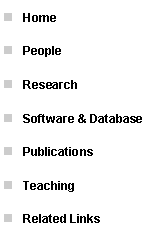
|
Hongkai’s Research Group |

|
Johns Hopkins - Nanjing Exchange Program in Statistical and Data Sciences |
|
The Johns Hopkins - Nanjing University Exchange Program in Statistical and Data Sciences is funded by The Benjamin and Rhea Yeung Center for Collaborative China Studies.
Featured events: 1. From July 11 to July 22, 2011, the program will offer four 5-day summer training courses in biostatistics in Nanjing University, lectured by faculty from Johns Hopkins Department of Biostatistics. (See course schedules below). 2. Hopkins faculty will host a recruiting event in Nanjing during the week from July 11 to July 15, open to students from all universities. Students interested in applying for Hopkins Biostatistics graduate programs are welcome to attend and meet with our faculty team. 3. Top two Chinese students in the summer courses will be invited to visit Johns Hopkins for 9 months to do research with Hopkins faculty. Expense will be covered by the Yeung Center grant. The courses are free and open to students from all universities and institutions. However, to be qualified for the Hopkins exchange, students must register for the courses and must be affiliated with Nanjing University. Exchange students are expected to have strong mathematics, computer science, physics, life science, or engineering background. 4. The program will also invite one young faculty from Nanjing University to visit Hopkins for 6 months. Please send your CV and letters of recommendation to hji@jhsph.edu in order to be considered.
Introduction to Statistical Measurement and Modeling Time: July 11 - July 15, 2011. 9am-12noon
Statistical Computing Time: July 11 - July 15, 2011. 2pm-5pm
Statistics for Genomics Instructor: Rafael Irizarry (Professor, 2009 COPSS Presidents’ Award) Time: July 18 - July 22, 2011. 9am-12noon Then describe the technologies used to measure genomics outcomes focusing on microarrays and second-generation sequencing. We will then cover data analysis topics as they relate to preprocessing, normalization, detection of differential expression, SNP detection/genotyping, copy number variants, and epigenetics. .
Univariate and multivariate survival analysis Time: July 18 - July 22, 2011. 2pm-5pm
Notice: 2011 Summer Courses in Nanjing Location: 南京大学 仙林校区 仙2-505多媒体教室 Time: July11-15,18-22, 9 am-12 noon, 2 pm - 5 pm (On Friday, July 15, the morning course will end at 11am, and the afternoon course will start at 2:30pm).
2011 Hopkins Biostatistics Recruiting Event at Nanjing Location: 南京大学 仙林校区 仙2-505多媒体教室 Time: July 15,11 am-12:30pm |